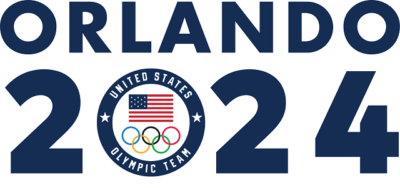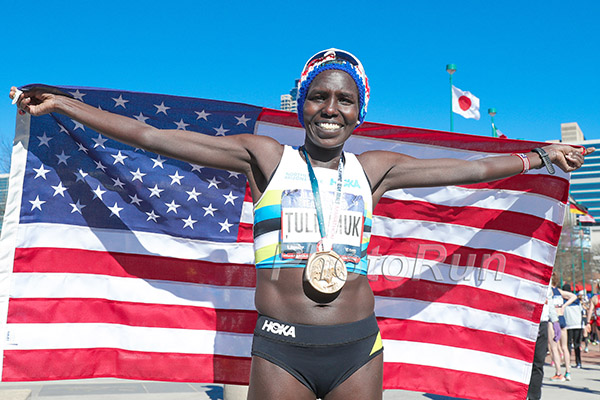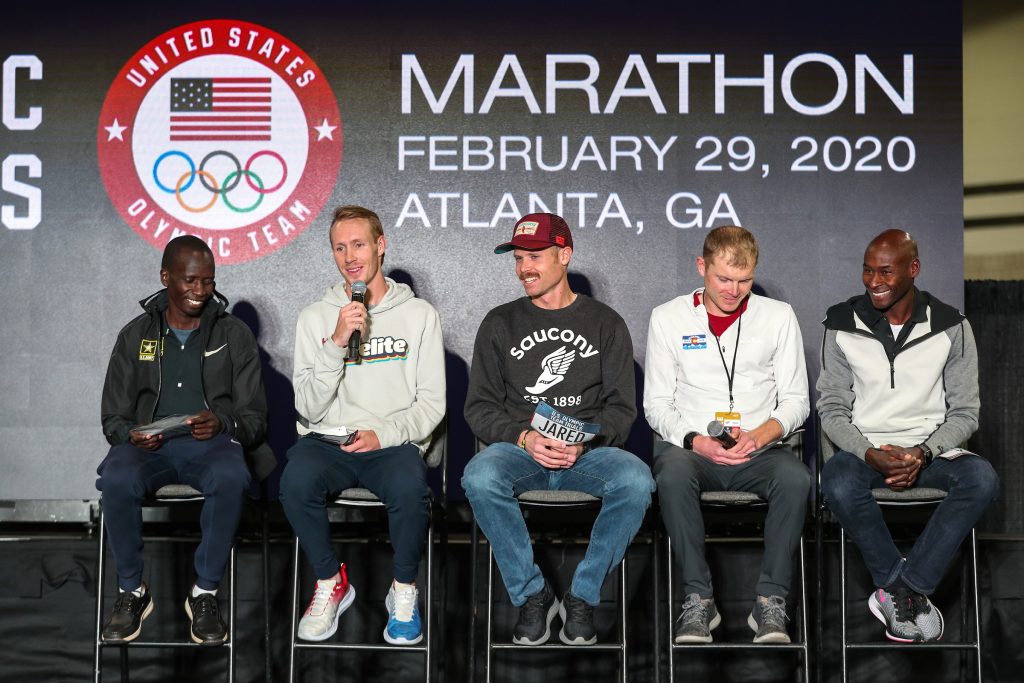Announcement on Olympic Marathon Trials Prize Money Expected by End of Week; Orlando LOC Says It Will Be More than Atlanta 2020
Orlando is planning on announcing details by the end of the week; the race is on February 3
By Jonathan GaultThe 2024 US Olympic Marathon Trials will be held 11 days from now in Orlando. As of now, no prize money structure has been announced for the February 3 race. The local organizing committee, the Greater Orlando Sports Commisssion (GO Sports), is expected to share the prize money structure later this week, according to Jay Holder, media director for the local organizing committee at the Olympic Trials.
“There is a prize money structure that has been proposed by the LOC,” Holder told LetsRun.com on Monday. “There’s a conversation continuing between the LOC and USA Track & Field…Rest assured, [the prize money] is in place. There are just some tiny details being worked out. How it’s distributed, essentially.”
Recently, the prize purse has been one of the first thing announced after an Olympic Trials site has been selected — the prize money for the 2020 Trials in Atlanta was announced in April 2018, 22 months before the race was held. USATF only announced Orlando as the host in November 2022 — 15 months before the Trials were to be held — and did not publicly announce specifics of the prize money at that time.
The LOC is responsible for covering prize money, and when Orlando was awarded the Trials in the fall of 2022, Runner’s World reported Orlando had agreed to provide $600,000 in prize money. But RW subsequently reported that, as of November 2023, there was no signed contract between USATF and GO Sports for the Trials. It remains unclear if or when a contract was signed; Holder said he did not know.
Holder confirmed the 2024 prize purse will be larger than the $480,000 prize purse the Atlanta Track Club provided for the 2020 Trials, but said he could not share specific numbers at this time.
“I would say go back to what’s been said earlier on in this process,” Holder said. “Expect pretty true to that.”
As for the reason for the delay, Holder said it was “just some final negotiations between the LOC and USATF.”
There has been some friction between USATF and the LOC during preparations for the Trials, notably surrounding the start time of the race. USATF initially requested a start time of 12 p.m. ET, in large part so that the races could be broadcast live nationally on NBC. When athletes asked for an earlier start time due to concerns about potential midday heat, the LOC resisted, claiming it had built sponsor and revenue opportunities based off the 12 p.m. start — and that USATF had initially told them the 12 p.m. start time was non-negotiable. The LOC — which includes GO Sports and Track Shack, the running events company enlisted to stage the Trials — told USATF the financial damages from moving the start time would amount to $700,000 and requested USATF help offset some of those costs.
Ultimately, the LOC and USATF agreed in November to move the start time to 10 a.m. ET (the races will now air live on the streaming platform Peacock with tape-delayed coverage on NBC beginning at 12 p.m.). It remains unclear whether USATF will reimburse GO Sports for any of the lost revenue but Holder said the delay in announcing prize money was unrelated to the start time changes.
“The prize money was not caught up in that conversation at all,” Holder said.
If $600,000 is indeed the final number, it will be a 25% bump from the 2020 Trials in Atlanta, but prize money was lower in 2020 in part because the LOC for those Trials, the Atlanta Track Club, offered to cover travel and lodging for all qualifiers — a sizeable cost considering 565 athletes wound up finishing the races. $600,000 would be equal to the amount of prize money awarded at the 2016 Trials in Los Angeles. However, there has been 29% inflation during the ensuing eight years; according to the U.S. Bureau of Labor Statistics, $600,000 in February 2016 would be worth $776,208 in December 2023. Factoring in for inflation, prize money now is way less than it was in 1996 when $500,000 was offered as $500,000 in 1996 is equivalent to nearly $1 million today ($977,520.71).
(Historically, USATF has also paid a bonus to any athlete who makes the Olympic team; that number was not included in the above calculations. For more on the history of prize money at the Olympic Trials, check out this article from April 2018: LRC History of Prize Money at the Olympic Marathon Trials).
***
An Update on the Road to Paris and the Third US Men’s Olympic Spot
As you are no doubt aware, the US has unlocked three women’s and two men’s spots in the 2024 Olympic marathon fields. At this point, there’s only one way the US can unlock the third and final men’s spot by the conclusion of the Trials, and that is for someone other than Conner Mantz and Clayton Young to run the Olympic standard of 2:08:10 at the Trials. The Trials record is 2:09:02 by Ryan Hall from the 2008 Trials, but there’s an outside chance someone could run sub-2:08:10 in Orlando if the weather is good since it is a fairly flat course.
As it stands, the top two finishers at the Trials who have run sub-2:11:30 within the qualifying window will be on the team. The third placer is likely to qualify as well, but if no one else runs 2:08:10 or faster on February 3, the US will have to wait until May 8 for that spot to be confirmed. The third spot will be awarded based on the Road to Paris list on May 8 (which is in turned based on performances through April 30), but there are a few complicating factors before we get there. Some of those have been resolved and some have not. Let’s run through them quickly.
What about the Rwandan doper?
For a while, Rwanda’s John Hakizimana was one of the athletes occupying a spot ahead of Scott Fauble, who is currently the third-highest ranked American on the Road to Paris list. The issue: Hakizimana is currently serving a doping suspension that expires in October 2025. This situation has been resolved as Hakizimana is ineligible to compete at the Olympics and has been removed from the Road to Paris list.
What about the Guatemalan?
Another of the athletes ranked ahead of Fauble is Alberto Gonzalez Mindez of Guatemala, who hit the Olympic standard by running 2:07:40 in Valencia in December. The issue here is that Guatemala’s Olympic committee is currently suspended by the IOC. But World Athletics confirmed to LetsRun that while Guatemala’s Olympic committee is currently suspended, its athletes are not. World Athletics told LetsRun that Mindez would be able to compete as an Independent Olympic Athlete so there is no need to remove him from the Road to Paris list.
What about universality places?
The Olympic field is capped at 80 athletes per sex. The first 64 athletes (or more accurately, their federations, who can reallocate those spots as necessary) in the Road to Paris list as of January 30 will be offered spots at the Olympics. The remaining 16 athletes will be selected based on the Road to Paris list as of May 8. So that means if you’re in the top 80 right now, you’re in a good spot — and Fauble is ranked 69th. There are still a few big marathons remaining between now and May 8 — notably, Seville (February 18), Tokyo (March 3), and London (April 21) — but for Fauble to fall out of the top 80, he’d need to be passed by 12 athletes from countries who don’t already have three qualifiers.
But there’s another set of athletes who could pass Fauble (or whoever the third American is at that point). Running statistician Carole Fuchs reached out to LetsRun to remind us that World Athletics awards universality places in the Olympics: any federation that does not have a single qualified male athlete in any Olympic track & field event is able to enter their best-ranked athlete in either the 100, 800, or marathon. These are known as universality places.
In the past, universality places could be awarded in any event except the 10,000, steeple, or multis. But for 2024, universality places can only be used in the 100, 800, or marathon. And universality places are capped at three per sex in the 800, meaning most of these places will be used in the 100 or marathon.
The way World Athletics’ qualifying document is written, there is supposed to be hard cap on 80 athletes in the Olympic marathon field. Universality places are supposed to be included in that number and are taken into account before the final spots are awarded on the Road to Paris list. LetsRun has tried to confirm this with World Athletics but has yet to receive a response.
It’s unclear how big of an issue this will be, though. At the 2020 Olympics, there was only one universality place awarded in the men’s marathon. Most federations typically are awarded universality places in the 100 meters. Even though the 2020 qualifying document placed a hard cap of 56 athletes in the men’s 100 meters, 83 athletes were ultimately allowed into the event with 27 of those spots going to universality athletes. It’s possible that happens again in 2024 even though the IOC has asked World Athletics to reduce the total number of athletes in track & field for this year (the target number across all events is 1,810 compared to 1,900 for 2020).
It’s also worth noting that federations must still provide proof of their universality athletes achieving a minimum technical level in their event. That’s harder to do in the marathon than the 100, and even the worst athlete will be done with the 100 meters in under 20 seconds whereas an awful marathoner could be on the course for three hours or more.
The guess here is that there won’t be more than a few universality places awarded in the marathon. But if World Athletics follows its published qualifying procedures, those places will take precedence over athletes qualifying via world rankings. And they would not be announced until May 1 — which means that if someone like Fauble finishes the spring in 79th and World Athletics awards two universality places, he could suddenly find himself bumped down to 81st at the last minute.
Alternatively, World Athletics can select the full 80-person field based on the Road to Paris list before expanding it by a few athletes to account for the universality places. That would go against its written procedures but that’s also what WA did in the men’s 100m in 2020 and no one raised a stink.
If all of this sounds complicated…well, it is. We’ll keep you posted if/when we hear back from World Athletics.






